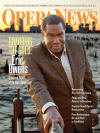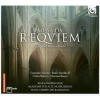Texte paru dans: / Appeared in:
*

JANUARY 2012 — VOL. 76, NO. 7
Pour
s'abonner / Subscription information
Harmonia Mundi
HMC902098

Code-barres / Barcode:3149020209820
This new release
appears be the first complete CD recording of Johann Christian Bach's Missa
da Requiem, which was composed in 1757–58, when Bach was in his early
twenties and living in Italy. Scored for double choir, soloists and
orchestra, the work contains only three movements — Introit, Kyrie and
Sequence ("Dies Irae") — and, while none of these ever threatens to get very
dramatic, the music is consistently pleasing with its hybrid
Renaissance-Baroque-Classical flavor. Also included here and new to CD is
the Miserere, J. C. Bach's setting of Psalm 51 dating from the same period
as the Requiem and cut from a similar cloth.
Based on the artistic success of this album, it is hard to understand why
neither the Requiemn or the Miserere is performed more frequently today,
although this success surely has much to do with the outstanding quality of
the ensembles involved with the recording — the RIAS Kammerchor and the
Akademie für Alte Musik Berlin. Both groups are superb, particularly the
Kammerchor, which performs with effortless vocalism, pristine ensemble and
ravishing blend across all parts. This is choral singing of the highest
order. The Akademie, conducted by Hans-Christoph Rademann, is likewise
brilliant in its elegant interpretation of Bach's melodic score.
The quartet of soloists is generally strong, though perhaps not optimal. Soprano Lenneke Ruiten sings with confidence throughout both works — her solo movement in the Miserere, "Cor mundum,"isespecially attractive — but her tone can take on a somewhat hardened, "matronly" quality that is off-putting. Colin Balzer's light tenor voice has a tendency to thin at the top of its range and become rather nasal; however, his head-dominant vocal approach suits the music well. His duets with alto Ruth Sandhoff are particularly strong from an ensemble standpoint, with each ornament executed cleanly and in perfect synch between the two voices. Sandhoff does a fine job of managing some difficult register shifts in her low-lying lines, while her warm, dusky voice provides both a strong tonal "match" to Balzer's tenor and a clear contrast with Ruiten's soprano. Bass Thomas E. Bauer sings solidly in his aria, "Quantus tremor" — in which, unfortunately, the balance favors the orchestra too prominently — and brings welcome musical shading to solo ensemble moments.
From a technical standpoint, the recording could hardly be bettered. Captured at the historically oft-recorded Jesus-Christus-Kirche, Berlin-Dahlem, the vivid sound features a natural, reverberant acoustic with plenty of airy space for the instrumental and vocal parts to meld together. Lovers of choral singing and lesser-known choral works are sure to be pleased.
Consultez toutes les critiques de cet
enregistrement:
Cliquez ici
Read all the reviews pertaining to this
recording:
Click here
Cliquez l'un ou l'autre
bouton pour découvrir bien d'autres critiques de CD
Click either button for many other reviews


